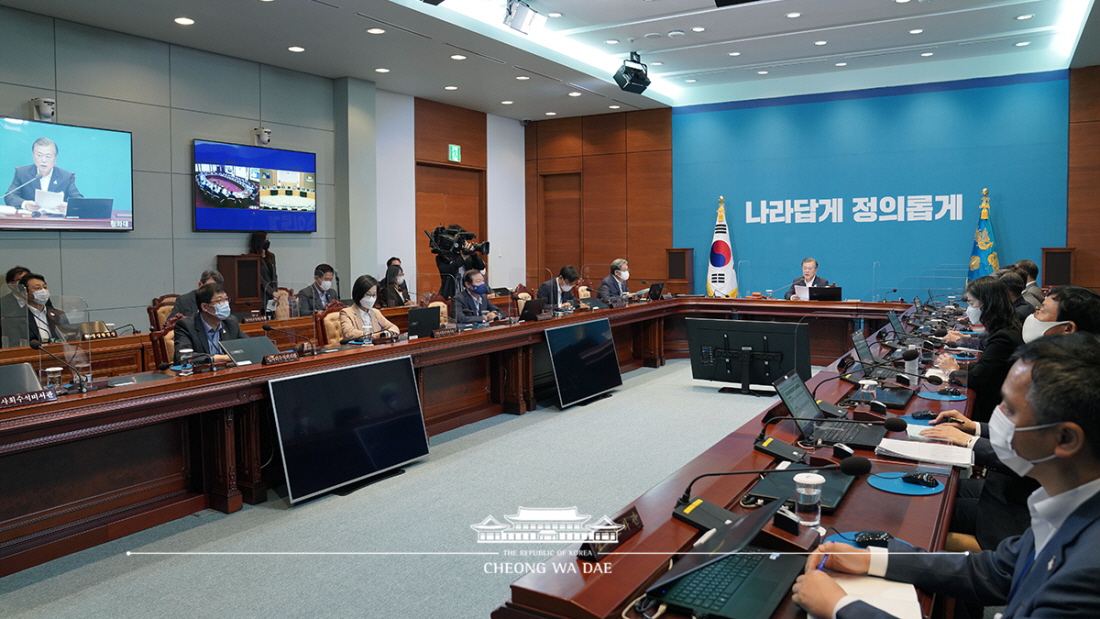이 웹사이트는 제19대 대통령 임기 종료에 따라 대통령기록관이 「대통령기록물 관리에 관한 법률」에 의해 이관받아 서비스하는 대통령기록물입니다. 자료의 열람만 가능하며 수정 · 추가 · 삭제는 불가능합니다.
다만, 「개인정보보호법」에 의하여 개인의 정보를 보호받기 원하시는 분은 관련 내용(요청자, 요청내용, 연락처, 글위치)을 대통령 웹기록물 담당자(044-211-2253)에게 요청해 주시면 신속히 검토하여 조치해 드리겠습니다. 감사합니다.
SPEECHES & REMARKS
BRIEFINGS

Let me begin the 45th Cabinet Meeting.
Today, we will make a decision on the government restructuring plan to upgrade the Korea Centers for Disease Control and Prevention (KCDC) to the Korea Disease Control and Prevention Agency (KDCA) and to establish a second vice minister post within the Ministry of Health and Welfare which will oversee healthcare policy. The KCDC’s enhanced standing represents epochal progress in our infectious disease response system. The KCDC, which has the support and backing of all citizens, was created by expanding and revamping the former National Institute of Health during the Participatory Government of the Roh Moo-hyun Administration. Since the MERS outbreak, the KCDC has been elevated to a vice-ministerial organization, thereby cultivating its capabilities further.
During the recent pandemic, the KCDC has been successfully carrying out a pivotal role at the forefront of Korea’s response to COVID-19, which has emerged as a global model. Based on the public’s increased confidence, the KCDC will finally be upgraded today to the KDCA, an independent government agency. It will be reborn as an organization with significantly enhanced independence and expertise that takes full charge of responses to infectious diseases.
With this substantial authority, the KDCA will be able to establish a well-coordinated and sophisticated response network, ranging from the monitoring of infectious disease outbreaks to investigation, analysis, crisis countermeasures and prevention. By creating the Research Institute of Infectious Diseases under the National Institute of Health within the KDCA, we can now establish an all-stage R&D system, from basic studies on infectious virus to clinical trials to vaccine development. Meanwhile, we will be able to strengthen local infectious disease response frameworks. We will build five disease response centers in different regions to pursue systematic cooperation with local governments. This will help local governments significantly enhance their ability to cope with infectious diseases and make epidemic prevention and control more robust in their communities.
It is also very meaningful that the Ministry of Health and Welfare will establish a new vice minister post to exclusively handle healthcare issues. At a time when a healthcare crisis is persistently affecting our daily lives, as we see with the recent COVID-19 outbreak, I expect this new position to provide an opportunity to greatly strengthen the capabilities of public healthcare and medical services. Along with the efforts to expand National Health Insurance coverage, we will help balance supply and demand with regard to public medical service personnel and improve the way healthcare and medical service professionals are treated. In addition, as mental health issues have recently resulted in huge social costs, related policies will also be strengthened. We will expand our policy to nurture the healthcare and medical service industry as well by utilizing big data and artificial intelligence as new growth engines for the future.
Our infectious disease response system and healthcare capabilities are already regarded as world-class, and they will be upgraded one notch higher through this restructuring. I ask you to reinforce our infectious disease response capabilities with the KDCA playing the central role. I urge you to help the people get past the resurgence of COVID-19 at this critical juncture and then bring the virus under control in a stable and resolute manner at the earliest possible date. I hope that, following the COVID-19 pandemic, we will be able to build enough capabilities to preemptively respond to and surmount even more severe infectious diseases that may come our way.
The role of the vice minister for healthcare is also very important. Most of all, the new office will have to concentrate on upgrading our healthcare and medical system further as soon as the COVID-19 situation is brought under control. I ask you to do all you can to devise rational solutions to safeguard people’s lives and health with regard to closing regional gaps in medical services, addressing issues raised by the medical community and expanding public health service by, for instance, establishing a hospital that specializes in treating infectious diseases. To that end, I ask you to work closely with the National Assembly, embrace a wide range of public opinions, and actively communicate with the medical community through the government-medical consultative panel.



